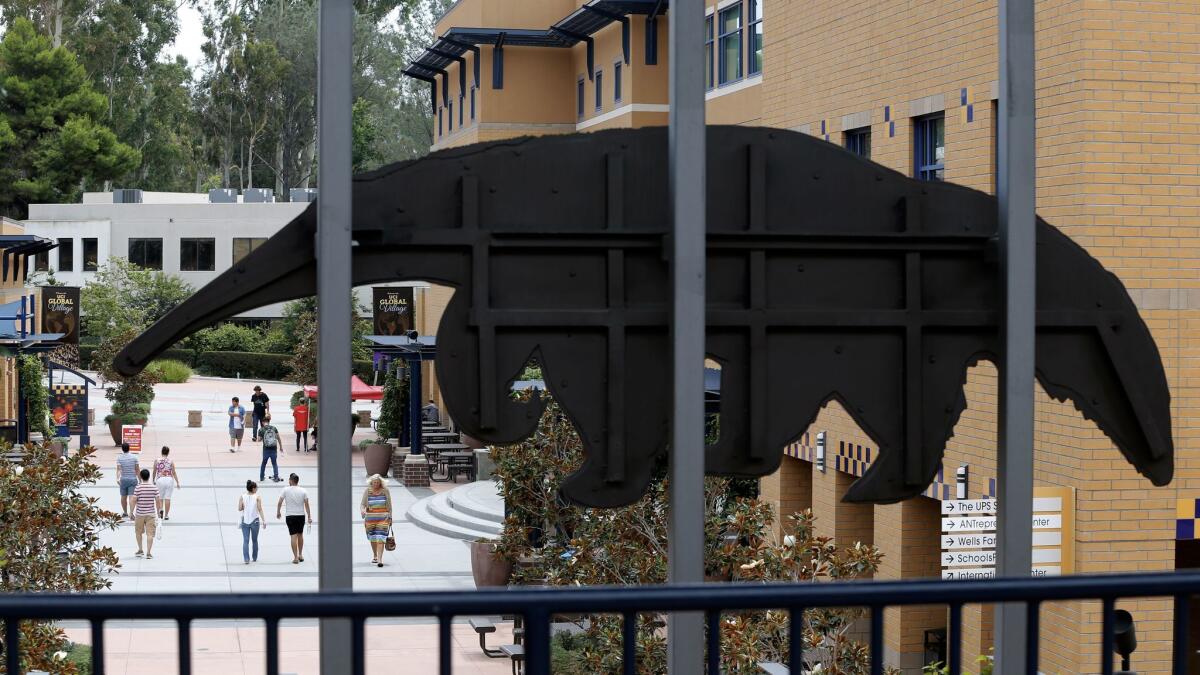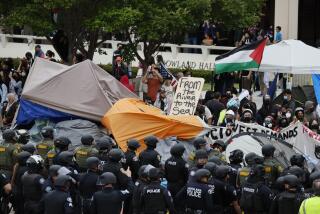UC Irvine chancellor apologizes after school rescinds admission offers

Reporting from San Diego — UC Irvine Chancellor Howard Gillman apologized Wednesday for the “unacceptable distress” caused to students after the campus abruptly rescinded nearly 500 admission offers this summer, and pledged the mistakes would not recur.
Gillman, speaking at the University of California regents meeting here, said he could not fully explain what went wrong or craft a corrective plan until an internal audit is completed in the next month. The campus has readmitted all but about 50 students, he said.
“We are a university recognized for advancing the American dream, not impeding it,” he told the regents.
The regents also discussed a preliminary budget for next year, including the impact of a potential increase in tuition and student fees. UC officials have laid out scenarios surrounding a 2.5% tuition increase and a 5% hike in the student services fee. That $348 increase, along with a $662 inflationary rise in other student expenses, could bring the total cost of attendance from $34,700 this year to $35,710 next year.
But that potential increase would be covered by financial aid for most UC undergraduates — 58% of whom pay no tuition. Only families earning more than $165,000 annually would pay the full $348 increase, officials said.
Nathan Brostrom, chief financial officer, said the university could be scrambling for more money next year because the state is not providing funding for 1,500 more California students expected to enroll and may reduce its annual budget increase to 3% from 4%, a $34-million difference.
More money also will be needed to cover rising pension costs and other campus needs, he said.
Newly appointed Regent Lark Park expressed discomfort with any tuition hike, cautioning against simply passing on higher costs to students. The regents took no action but will vote on a budget at their November meeting.
Throughout the day, several regents expressed frustration over the mounting demands on the 10-campus UC system and lack of state dollars to pay for them. Regent Charlene Zettel suggested her colleagues encourage legislators to “step up to the plate and start funding education.”
“We can’t continue to compress, compress, compress,” she said.
Shane White, the Academic Senate chairman, told the regents that diminished state funding was at fault for a “slow corrosion” of the vaunted UC system — which still managed to land five of its 10 campuses onto the latest U.S. News & World Report’s list of top 10 public universities. White noted that per-student spending has declined by 34% since 2000-’01.
On the rescission front, UC President Janet Napolitano announced a new task force to make the system’s admission verification process more effective and responsive. Last year, more than 216,000 students applied to the UC system’s nine undergraduate campuses. Applicants self-report their grades, courses and test scores at the time, but the university requires those who choose to enroll to verify the information with transcripts by July.
The number of students who fail to provide that information and subsequently lose their seats varies by campus and year.
Last year, UC Irvine withdrew 66 admission offers because of missing paperwork. But this year, Gillman told regents, about 850 more students accepted the university’s admission offer than expected, and the campus was short about 400 beds for them.
UC Irvine officials hoped to reduce the overflow by having other campuses take some of their students and offering reduced tuition for those willing to defer their admission a year and take courses through the extension program instead. Ultimately, however, officials decided to crack down on those who did not meet deadlines for paperwork or failed to maintain good senior-year grades.
The rescissions stunned and outraged students, some of whom said their hard-earned admission offers were withdrawn for minor or bogus reasons.
“For reasons I cannot explain at this time, unacceptably terse and unhelpful withdrawal notifications were sent to those 500 students,” Gillman said. “Our notifications did not assist people with an appeals process and also led to an overwhelming of an antiquated phone system, which simply couldn’t handle the terrible flood of panicked inquiries.”
Gillman said he learned of the chaos about a week after the notifications were sent out and failed to ask the “hard questions” about other options. But he said he quickly decided that a “reset” was needed and directed that most of the students be readmitted.
Some regents praised the chancellor’s contrition and candor.
“For an institutional leader, the willingness to admit fault and issue a timely apology is something that I think is rare … in higher education,” said Paul Monge, the student regent. “It’s something we needed.”
ALSO
Ex-Costa Mesa High coach gets 270 days in jail for trying to seduce detective posing as teen
UC sues Trump administration for shutting down DACA, which UC’s president helped create
More to Read
Sign up for Essential California
The most important California stories and recommendations in your inbox every morning.
You may occasionally receive promotional content from the Los Angeles Times.











